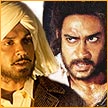
|
Ajay steals a march over Bobby
The verdict on the two Bhagat Singh films
|
Amberish K Diwanji
The life and death of Shaheed [martyr] Bhagat Singh is an amazing story. It is but natural that it should spawn a slew of movies. While three were made in the decades gone by, four more have been made this year (three already released), along with a teleserial.
Why this sudden interest in Bhagat Singh? Perhaps someone could explain this to me later. One reason could be because the character is romantic: hanged by the British at age 23, the young revolutionary died for his ideal of Free India.
Of the three films on Singh already released, keen interest is on those with two well-known Bollywood names, Ajay Devgan and Bobby Deol, in The Legend Of Bhagat Singh and 23rd March 1931 -- Shaheed, respectively.
Both movies have their good moments, and plenty of bad ones. And clearly, both directors --- Rajkumar Santoshi of The Legend and Guddu Dhanoa of 23rd March --- have taken liberties with the script. Every artiste has the right to make his story easy to comprehend, after all.
Explaining Bhagat Singh's story, the circumstances and defining moments of the era --- the British Raj; the Jallianwala Bagh massacre; the Congress Party-led, anti-British struggle (it had not yet evolved into the freedom struggle), whose leadership had just been taken over by Mahatma Gandhi; why Bhagat Singh preferred to join Chandrashekhar Azad's Hindustan Republican Army (later renamed the Hindustan Socialist Republican Army) --- is no easy task.
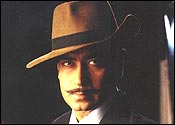 One wishes the directors were truer to the subject and had eschewed the filmi nonsense so easily --- and badly --- displayed. The constant shouting and mouthing of dialogues, the grimacing and clenching of jaws to show patriotism are pure Bollywood pulp and totally unnecessary. Dialogues are necessary to get the crowds in and the adrenaline going, but must they be shouted out?
One wishes the directors were truer to the subject and had eschewed the filmi nonsense so easily --- and badly --- displayed. The constant shouting and mouthing of dialogues, the grimacing and clenching of jaws to show patriotism are pure Bollywood pulp and totally unnecessary. Dialogues are necessary to get the crowds in and the adrenaline going, but must they be shouted out?
Bobby Deol places his hand in fire --- a throwback to the Manoj Kumar film Shaheed on Bhagat Singh, where he places his hand over a candle flame. Perhaps Guddu Dhanoa could explain how burning one's hand proves patriotism. (Of course, the hand is quite unscathed.)
Bollywood makes strong demands on filmmakers. One is for an 'item' song. Neither producer --- Kumar S Taurani of Legend, and Dharmendra (father of Bobby Deol), of 23rd March --- dared refrain.
The difficult bit is, Bhagat Singh never married nor did he have a girlfriend.
The closest he came to matrimony was when his parents tried to matchmake him with a girl. Both filmmakers latch on to this slim wedge just to have a girl sing. In 23rd March, it is Aishwarya Rai with a fully choreographed team --- a jarring scene.
Of the two films, The Legend is way ahead, in terms of the narrative and performance. What gives it an edge is, despite its flaws, it captures Singh's life well. How a young Singh visits Jallianwala Bagh to pick up blood-stained soil; how he befriends Sukhdev and later Rajguru (who were hanged with him on March 23, 1931); how he teams with Chandrashekhar Azad in Cawnpore (now Kanpur); and how his ideals --- he was an agnostic and a committed secularist --- shape his philosophy and mission.
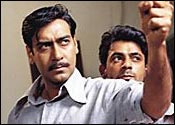 Perhaps the best part of The Legend is how it shows Bhagat Singh's desperation to make his freedom call heard across India, and the reason why he chucks bombs into the Central Assembly and lets himself get captured along with his colleague Batukeshwar Dutt. Singh had coined the now-famous line: to make the deaf hear, one has to make a big noise.
Perhaps the best part of The Legend is how it shows Bhagat Singh's desperation to make his freedom call heard across India, and the reason why he chucks bombs into the Central Assembly and lets himself get captured along with his colleague Batukeshwar Dutt. Singh had coined the now-famous line: to make the deaf hear, one has to make a big noise.
The idea was to use the courtroom and the resultant publicity to get the message across --- Singh realised that merely killing a few British officials only got them labelled terrorists.
The buildup of the movement, that Bhagat Singh changed the party's name from Hindustan Republican Army to Hindustan Socialistic Republican Army, arguing that freedom means giving Indian workers and farmers a better life; his famous hunger strike in prison to demand better rations and living conditions for the prisoners, the movement that galvanised the entire nation then --- all make this film worth watching and give it relevant historical background.
In contrast, 23rd March is more concerned about glorifying Bobby Deol and his brother Sunny. Dialogues are delivered for the audience, not to re-enact history. The killing of police officer Saunders for his lathi [baton] charge on Lala Lajpat Rai, the foremost anti-British leader in Punjab in the 1920s, is a long-drawn sequence involving a rather melodramatic chase, which only makes the plot appear poorly planned.
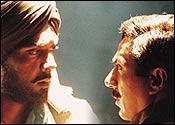 Worse is the scene where Azad is cornered by the police in an Allahabad park. Sunny shoots at least a dozen policemen and British officers, including an officer whom he shoots without even looking, reducing Azad's act to some kind of a video game.
Worse is the scene where Azad is cornered by the police in an Allahabad park. Sunny shoots at least a dozen policemen and British officers, including an officer whom he shoots without even looking, reducing Azad's act to some kind of a video game.
Both films fail to capture the agony of Bhagat Singh's fight. Even when Bhagat Singh is being chained and whipped, both Devgan and Deol wax paragraphs on how they are willing to die for Mother India.
Deol's film also plays to the gallery by making the British appear stupid fools. They were neither. In this film, one could be forgiven for thinking they were cruel, conniving people, who had tricked India out of her Independence. Towards the end, the film is reduced to a match between Bhagat Singh and the jailor.
At least The Legend explains how the British were concerned at Singh's growing popularity. And the tension between the governor of Punjab and then viceroy, Lord Irwin, is brought out very well.
Where it fails is in the caricaturising of Mahatma Gandhi and the Congress Party as cowards who preferred nonviolence to the violence of Singh and Azad.
Gandhi is shown negotiating the Gandhi-Irwin pact and feebly asking whether Singh and his condemned associates could be spared. The viceroy refuses, making you believe that Gandhi condemned the trio to be hanged by inking the agreement. This agreement, in fact, had a different history and context.
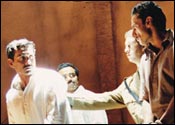 Santoshi here seems to have fallen victim to the current trend: maligning Gandhi without understanding the movement he sought to lead or the context of the 1920s and early 1930s.
Santoshi here seems to have fallen victim to the current trend: maligning Gandhi without understanding the movement he sought to lead or the context of the 1920s and early 1930s.
23rd March, for its part, simply steers clear of the Gandhi and Congress, except for a brief mention.
In terms of performance, Devgan is clearly the winner, with the advantage of a stronger script and a better director. Devgan, who reportedly lost weight to look the part, is today emerging as one of India's finest actors, willing to try out different roles. Deol tries his best, but it is difficult to shout and act simultaneously.
Finally, in both movies, the scene that lingers is when Singh meets his parents for the last time. It is a tender, touching moment, with both Devgan and Deol giving an understated, brilliant performance.
The Legend's Raj Babbar, playing Kishen Singh, Bhagat's father, pleading his son's forgiveness and saying, "What else could a father do," is terrific: no melodrama, no overacting. Farida Jalal, as Bhagat's mother, does an excellent job as a mother trying to be brave for her condemned son.
Similarly, in 23rd March, Amrita Singh as Bhagat's mother is fabulous in the beginning when she tries to answer her son's questions and failing. And especially when she meets her son for the last time. Tej Sapru as Bhagat's father, bidding his son goodbye, is very effective.
Which states my point: one doesn't need to roar to render brilliant performances.